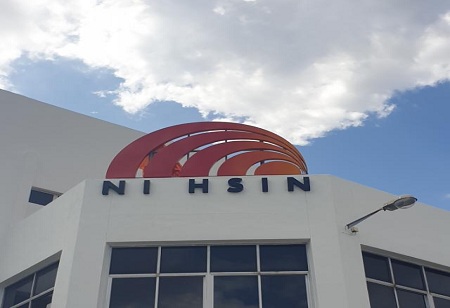
Malaysian firm, Ni Hsin signs strategic collaboration with SIRIM

 In order to foster cooperation between the Parties in the following areas, Ni Hsin EV Tech Sdn. Bhd., a fully owned subsidiary of Main Market-listed Ni Hsin Group Berhad (formerly known as Ni Hsin Resources Berhad), inked a Strategic Collaboration with SIRIM Berhad.
In order to foster cooperation between the Parties in the following areas, Ni Hsin EV Tech Sdn. Bhd., a fully owned subsidiary of Main Market-listed Ni Hsin Group Berhad (formerly known as Ni Hsin Resources Berhad), inked a Strategic Collaboration with SIRIM Berhad.
(a) setting up of a Lithium-Ion Battery Recycling Plant in Malaysia through Public-Private Partnership (PPP) funding model;
(b) providing an eco-system for a circular economy model in mitigating the impact on the environment as a result of Lithium-Ion Battery being processed illegally in Malaysia;
(c) potentially setting up a Lithium-Ion Battery manufacturing plant in Malaysia; and
(d) introducing a Lithium-Ion Battery Recycling policy working with the Government of Malaysia. (collectively the "Project")
"This Strategic Collaboration with SIRIM is an extension of our desire for broader participation in the green economy," stated Khoo Chee Kong, managing director. After successfully launching our electric motorcycles last month, we are eager to solve yet another environmental puzzle. Lithium-ion batteries (LIBs) have become increasingly the focus of political and environmental debates as the world has learned to rely on and adore the power and convenience they provide. The majority of wasted LIBs are eventually stored or landfilled, which contaminates the environment and wastes energy and non-renewable natural resources. LIBs will have significant negative effects on the environment and hasten the depletion of mineral reserves if they are not recycled and reused. Environmental contamination is not the sole issue.Poor handling and disposal during the LIBs' end-of-life cycle could raise the danger of a fire or poisoning. The main difficulty in the upcoming years will be how to dispose of the massive amounts of batteries from electric automobiles. A qualified e-waste recycler who can handle and recycle LIBs safely and responsibly is now required.
"Establishing a Lithium-Ion Battery Recycling Plant is the right step in advancing Ni Hsin's green goal and bolstering the government's commitment to a more sustainable, resilient, and inclusive development in line with the United Nations' 2030 Sustainable Development Goal" (SDG). Along with reducing environmental effect, the collaboration intends to establish an eco-system for a circular economy model and to lead the development of a policy for recycling lithium-ion batteries in partnership with the Malaysian government.Currently valued at over $1.7 billion, the LIB recycling business is predicted to grow dramatically over the next ten years. There is just one such recycling facility in the ASEAN region, located in Singapore, and it has a daily recycling capacity of 14 tonnes of lithium-ion batteries. Ni Hsin is more appealing to investors who are starting to take sustainability concerns into account when making investment decisions because it was one of the pioneers in this area.
We are honoured to collaborate with SIRIM on this green project because they will be a vital partner in guaranteeing its success thanks to their extensive knowledge and cutting-edge technical skills. "Under the green technology master plan 2030 of Malaysia, several strategies were outlined to create a low-carbon and resource efficient economy. Therefore, in complementing this master plan, SIRIM will be launching various projects towards enhancing and promoting sustainability in line with the Sustainable Development Goals (SDGS)," said Dato' Indera Dr. Ahmad Sabirin Arshad, the president and group chief executive officer of SIRIM.
The statement from Dato' Indera Dr. Ahmad Sabirin Arshad reads, "SIRIM is ever ready to cooperate with any parties that are interested to explore any sort of recycling company where we can contribute in terms of the latest technology towards expanding our local recycling capacities for e-waste."
In 2023, the SIRIM-Ni Hsin Lithium-Ion Battery Recycling Pilot Plant will be fully operational, with a 550-ton lithium-ion battery recycling capacity per year. The output will initially be sold as black mass to producers of lithium-ion batteries. In accordance with this partnership, both businesses will concentrate on recovering precious metals like lithium and cobalt in 2024 before starting to produce lithium-ion batteries in 2025 when demand increases as a result of processing more lithium-ion batteries from other countries. he added.

